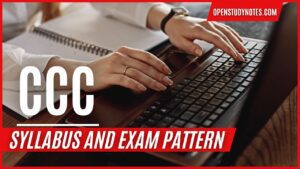CCC Syllabus and Exam Pattern

Course on Computer Concepts (CCC)
The Course on Computer Concepts (CCC) by the National Institute of Electronics and Information Technology (NIELIT) is designed to equip individuals with essential computer skills for both professional and everyday use. Here’s a detailed overview of the syllabus and exam pattern:
Objective
The primary objective of the CCC course is to:
- Build confidence in using computers in office and general life.
- Familiarize users with basic computer components and terminology.
- Teach file management, and how to create documents using word processing, spreadsheets, and presentation software.
- Provide knowledge about computer networks, internet browsing, email usage, and collaboration tools.
- Educate on e-Governance applications, social networking platforms, and digital financial services.
- Develop an understanding of future skills like Internet of Things (IoT) and Big Data Analytics.
Duration
- Total Duration: 80 Hours
- Theory: 32 hours
- Practical: 48 hours
This course can also be offered as an intensive 10-day full-time course.
Eligibility
- There are no minimum qualifications required for applying and appearing for the CCC examination.
Job Roles
After completing the course, individuals can work as:
- Computer Operator
- Data Entry Operator
- Social Media Operator
Detailed CCC Syllabus and Learning Outcomes
1. Introduction to Computer
- Duration: 3 hours theory, 3 hours practical
- Topics Covered:
- Evolution of Computers & IT gadgets and their applications.
- Basics of Hardware and Software.
- Components like CPU, input/output devices, memory, storage, and different types of software.
- Learning Outcomes:
- Identify and explain the evolution and applications of computers and IT gadgets.
- Familiarity with various hardware components and software types.
2. Introduction to Operating System
- Duration: 3 hours theory, 4 hours practical
- Topics Covered:
- Basics of Operating Systems for desktops, laptops, and mobile devices.
- User interface, file and folder management, and system settings.
- Learning Outcomes:
- Acquaintance with operating systems and their applications.
- Ability to manage desktop screens, modify properties, and handle file extensions.
3. Word Processing
- Duration: 4 hours theory, 8 hours practical
- Topics Covered:
- Basics of word processing, document creation, editing, formatting, and printing.
- Advanced features like header/footer, tables, and mail merge.
- Learning Outcomes:
- Proficient in creating, formatting, and printing documents, including PDFs.
4. Spreadsheet
- Duration: 4 hours theory, 8 hours practical
- Topics Covered:
- Basics of spreadsheets, cell address, data entry, and page setup.
- Formulas, functions, chart creation, and data sorting/filtering.
- Learning Outcomes:
- Competent in spreadsheet creation, data manipulation, and applying formulas/functions.
5. Presentation
- Duration: 4 hours theory, 8 hours practical
- Topics Covered:
- Creating and manipulating slides, inserting multimedia, and slide show settings.
- Printing slides and handouts.
- Learning Outcomes:
- Skilled in creating, enhancing, and presenting PowerPoint presentations.
6. Introduction to Internet and WWW
- Duration: 3 hours theory, 4 hours practical
- Topics Covered:
- Basics of computer networks, internet concepts, IP addresses, and web browsers.
- Internet connectivity, device identification, and web page handling.
- Learning Outcomes:
- Knowledgeable about network types, internet applications, and browsing techniques.
7. E-mail, Social Networking, and e-Governance Services
- Duration: 3 hours theory, 6 hours practical
- Topics Covered:
- Email account creation, email usage, social networking platforms, and e-commerce basics.
- Overview of e-Governance services like railway reservation, passport services, and eHospital.
- Learning Outcomes:
- Proficiency in email management, social networking, and accessing e-Governance services.
8. Digital Financial Tools and Applications
- Duration: 4 hours theory, 4 hours practical
- Topics Covered:
- Understanding digital financial tools like OTP, QR codes, UPI, AEPS, and internet banking.
- Online bill payments and digital locker usage.
- Learning Outcomes:
- Familiarity with digital financial services and secure online transactions.
9. Overview of Future Skills & Cyber Security
- Duration: 4 hours theory, 4 hours practical
- Topics Covered:
- Introduction to future skills like IoT and Big Data Analytics.
- Basics of cyber security and safe online practices.
- Learning Outcomes:
- Understanding emerging technologies and fundamental cyber security measures.
CCC Exam Pattern
The CCC examination tests the knowledge gained during the course through a structured format:
- The exam includes multiple-choice questions (MCQs).
- It covers theoretical understanding as well as practical applications of computer concepts.
- The exam is conducted online.
Conclusion
The CCC course provides a comprehensive foundation in computer literacy, essential for various professional roles and personal use. It prepares individuals to confidently use technology in their daily activities and future careers.
FAQs
- What is the eligibility criteria for the CCC course?
- There are no minimum qualifications required for applying and appearing for the CCC examination.
- How long is the CCC course?
- The course duration is 80 hours, which can be completed over a period of time or as an intensive 10-day full-time course.
- What are the job roles after completing the CCC course?
- Individuals can work as Computer Operators, Data Entry Operators, and Social Media Operators.
- What topics are covered in the CCC course?
- The course covers a wide range of topics including computer basics, operating systems, word processing, spreadsheets, presentations, internet usage, email, social networking, digital financial tools, and future skills.
- How is the CCC exam conducted?
- The CCC exam is conducted online and consists of multiple-choice questions covering both theoretical and practical aspects of the course.
Also; Visit:
CCC Study Books and Practice Set

10 thoughts on “CCC Syllabus 2024 and Exam Pattern”